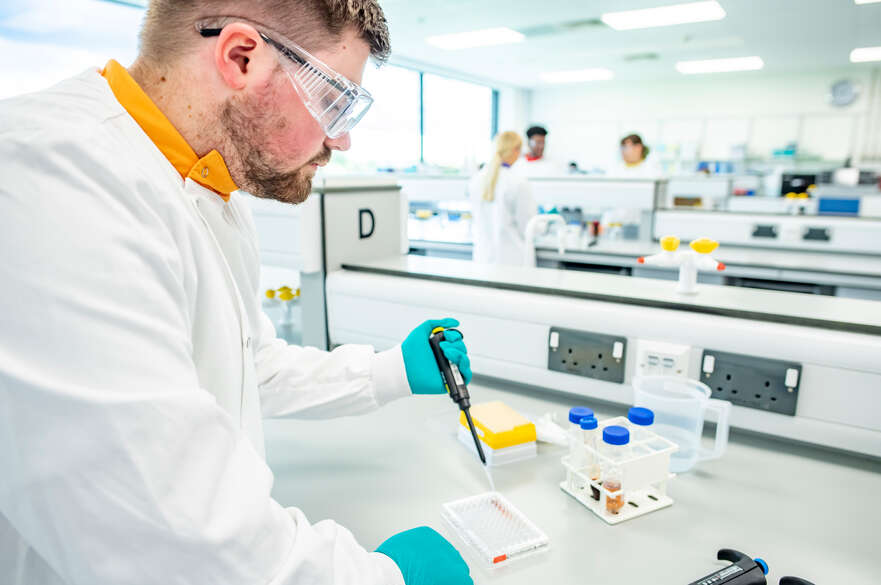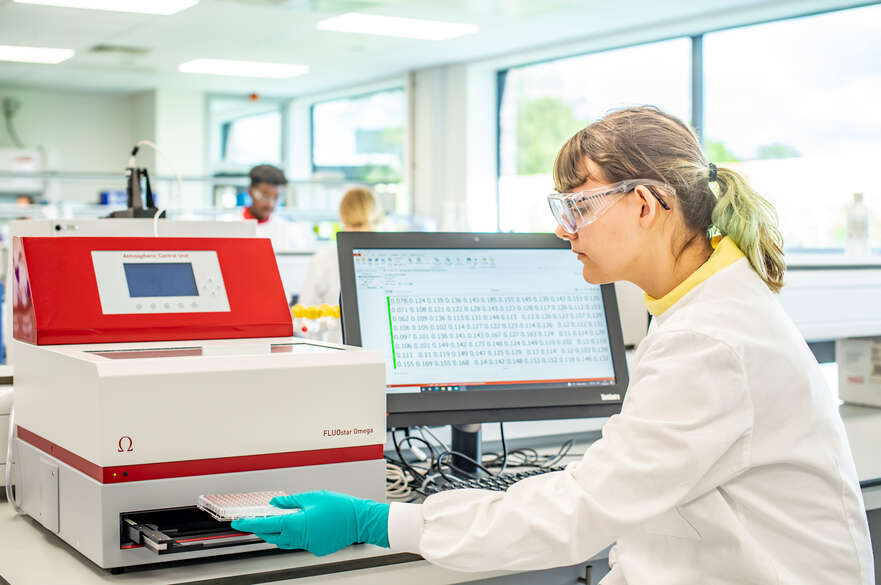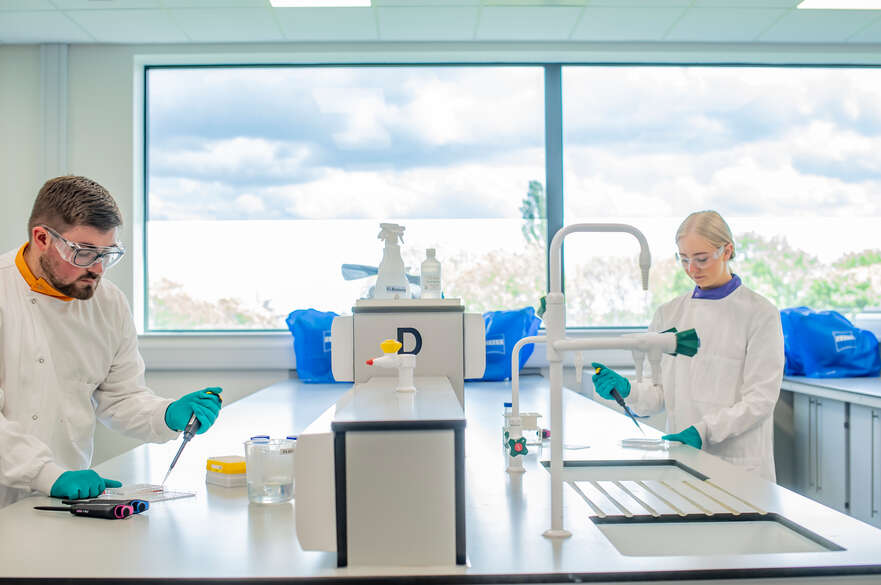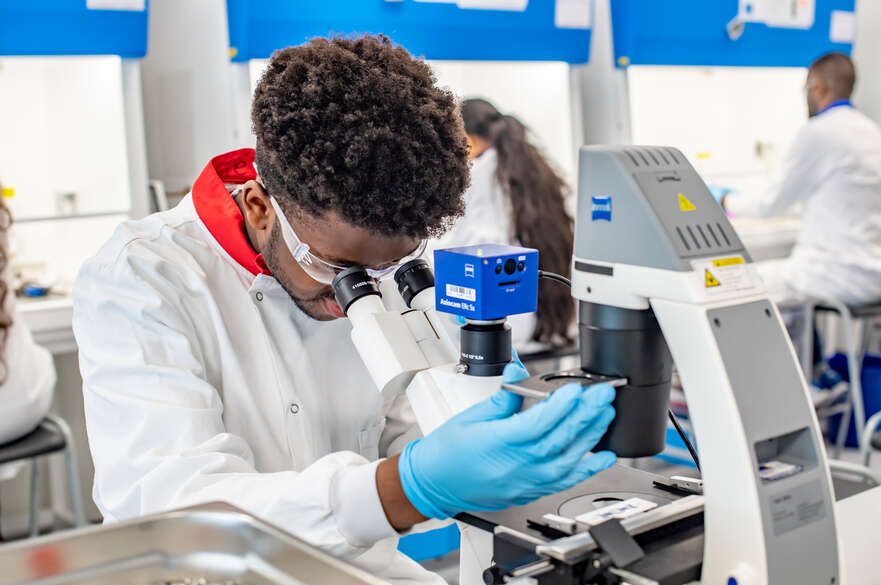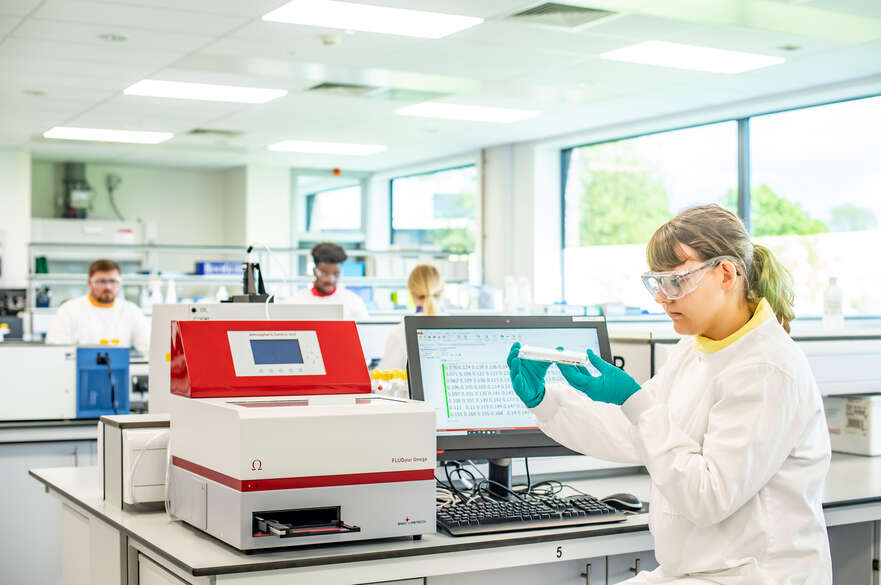This course is in Clearing
Offers from 80 tariff points
About this course
Biochemistry is the chemistry of life and on this course we bring it off the page. You’ll not only discover how this subject is vital to humanity, but even play a part in applying it to global challenges. Your journey will start with discovery of disease at a molecular level – preventing, diagnosing and treating – before looking at drug development, biological tools and genetically modified products. We show you how this fascinating subject can be applied in everyday life in from diabetes to cancer.
There‘s no substitute for doing it yourself, so that’s why we give you lots of chances to apply your skills in our labs so you’re a confident, work-ready graduate.
Why study BSc (Hons) Biochemistry at NTU?
Get industry experience
Through group work and the Practical Techniques for Biology and Molecular Bioscience in Practice modules you’ll develop problem solving skills by testing and learning. These are valuable skills for any graduate to have and we make sure you get this experience right from the start of your course. We’ve also embedded employability skills in the course, so you are not only learning theory and skills, but you know where to find your dream job and how to apply for it.
Alongside your course our Biochemistry Cafe programme runs throughout the year. You’ll get to take part in biochemistry focused employability workshops and job fairs – another chance to boost your skills before graduation.
Community and support
With support from your lecturers, personal tutors and technical staff, you can be sure we'll be here for you during your studies. Alongside your lectures and lab classes you’ll also have tutorial sessions. These are a chance to regularly meet in small groups with your personal tutor and members of your course to discuss the topics you are studying.
Got any feedback on your course? You’ll have lots opportunities to discuss your course, for example in your tutorial sessions, with your course leader and course reps and you even have the chance to feedback on every module you study with an end of module survey. We love to hear your feedback and how we can make improvements. Following your feedback, we have recently added Professional Skills modules which are specific to the area of biosciences you are studying. We’ve also increased our support for your coursework assignments too, through drop-in sessions accessible when you need them most.
There’s support from your peers too. Our mentoring schemes gives you support from other students on your course. Whether you need help with your studies or university life in general, they’ve been there and can give you a students’ perspective. Find out more about the support you’ll receive at NTU.
Meet our staff
Whether your interest is working in research or in industry we have experienced teaching and technical staff from a wide range of backgrounds. They’ll be teaching you the latest thinking in biochemistry and their contacts help us secure guest speakers and support you in finding great placement opportunities.
In your final year you’ll work on an individual research project. You’ll work closely with a member of staff and your project will be linked to their research area. This means you’ll be getting a real experience of research in practice which will look great on your CV.
What you’ll study
What you'll study
You’ll develop an understanding of what is happening inside the cells of living organisms and how this has changed through the evolutionary process. With a focus on understanding the data, you’ll look at DNA / RNA synthesis, proteins and genetics and learn how these can unlock the diagnosis of biochemical disorders and human diseases. Understanding, analysing and drawing meaning from data is becoming increasingly important in industry. We’ve recently redeveloped this course to include bioinformatics skills across all years of your course. If you are really interested in this growing area of biochemistry, then you can also immerse yourself further by focusing on bioinformatics for your final year research project.
As the course is highly practical, you’ll get experience in cutting edge molecular biology techniques such as DNA/RNA technology, protein analysis, diagnostics, as well as bioinformatics. You will also gain key biochemical skills such as biochemical catalysis, protein purification and enzyme kinetics.
Study abroad opportunities
Get ready to embark on an adventure with our study abroad programs at partner universities or by getting a work placement overseas. Both opportunities will boost your employability, build lifelong friendships, and allow you to experience the world in a whole new way.
Introduction to Biochemistry
Study the key aspects of macromolecules, cell structure and function, and interrelationships in both practical and theoretical contexts.
Living Systems
Introduces levels of biological organisation from molecules to cells and ecosystems, providing a platform of knowledge and skills upon which other modules are developed.
Molecular Principles for Biochemistry
This module will teach you the fundamental concepts of organic, physical, analytical and biological chemistry as applied to the biochemistry process.
Introduction to Pharmacology
Considers the principles of how drugs work, including factors that affect the magnitude of the response to drugs, specificity of drug action, drug interactions and side effects of drugs.
Practical Techniques for Biology
Considers the principles of experimental design, data collection and analysis, including techniques in centrifugation, chromatography, electrophoresis, microscopy and radiobiology.
Genetics and Immunology
Develops genetic concepts and introduces basic aspects of the immune system, including the molecules, cells and interactions involved.
Advanced Biochemistry
Study the concepts of current biochemical techniques and their practical applications in science.
Molecular Bioscience in Practice
In this module, you’ll get an overview of the immune response including the structure of antibodies, the development of an antibody response and the production of polyclonal and monoclonal antibodies. You’ll explore the antibody as a molecular probe and develop antibody-based techniques and assays.
Metabolism and its Control
Explore the central pathways of oxidative catabolism and anabolism of carbohydrates and fats in eukaryotic cells. You’ll also cover the biochemical basis of cellular signal transduction.
Biomolecular Structure and Function
Explore the functions of polymerases, binding proteins, helicases, ligases, topoisomerases and chromosomes in DNA replication.
Clinical Biochemistry
Study a variety of disorders and learn about their clinical symptoms, biochemical and molecular defects, detection, diagnosis and treatment.
Molecular Genetics of Human Diseases
You will develop knowledge and understanding of gene therapy.
Optional year-long work placement. If you are not taking a placement, you will progress directly to your final year in year three.
Global Challenges in Health and Degenerative Disease
An in-depth look at latest developments in the biochemistry field and their effects in current global issues.
Cell Signalling and Cancer
A range of exciting and up to date topics on cell proliferation and cell death. The cell cycle, the cytoskeleton and signal transduction will be presented, and we will discuss their implication in carcinogenesis.
Applied Bioinformatics
Use cutting edge bioinformatics methods to understand and identify the role that gene and protein biomarkers play in disease. Analyse real clinical data and model various scenarios that predict the clinical impact of the disease.
Research Project (40 credit points)
You have the option of either completing a 40 credit point project / dissertation
Comparative Developmental and Evolutionary Genetics
Introduction to developmental biology and concepts in speciation and evolution.
We regularly review and update our course content based on student and employer feedback, ensuring that all of our courses remain current and relevant. This may result in changes to module content or module availability in future years.
Video Gallery
How you're taught
You will typically study six modules in Year One and Two. Each module involves substantial amounts of practical work, in addition to lectures. In your final year you’ll study five modules and a research project.
You’ll learn through a mix of:
- lectures - covering the key theories
- seminars - smaller-group sessions perfect for learning key skills and collaborative working
- practical sessions - using our extensive range of industry-standard facilities
- workshops - this includes surgery sessions where you’ll meet with your lecturer in small groups to discuss any problems or work through challenging topics.
The rest of your time will be spent carrying out independent study such as reading textbooks and lecture notes, and working on exercises.
A placement year may be taken between year 2 and year 3 of study.
Research informed teaching
Our research is tackling real-world issues – and the people working on this research will be teaching you. It also informs the subjects you’ll be studying with us so you can be sure your knowledge will be cutting-edge in your field. In the last Research Excellence Framework (REF 2021) - the UK's system for assessing the quality and impact of research in universities - we’re proud that 99% of NTU’s Allied Health Professions, Dentistry, Nursing and Pharmacy submission was assessed to be world-leading or internationally excellent.
Hands-on learning
The course is very practical and you’ll be spending lots of time in our industry-standard laboratories. This is because we believe the amount of time you spend getting hands-on experience in a laboratory is very important to prepare you for the world of work.
You’ll get to use our industry-standard equipment, such as our nucleic acid and protein analysis systems, right from the very start of your course. You’ll get to know how a professional lab works and how to follow laboratory processes and protocols used in industry – all valuable skills to have before you graduate.
We have a focus on using digital skills to support you in your practical sessions. For example, you might do an online simulation of the experiment you are going to perform in the lab. This will get you familiar with the techniques and protocols so you can be confident and really make the most of your time in our labs.
Learn a new language
Alongside your study you also have the opportunity to learn a new language. The University Language Programme (ULP) is available to all students and gives you the option of learning a totally new language or improving the skills you already have. Learn more about the ULP.
How you're assessed
People excel in different ways, and we want everybody to have the best possible chance of success. That’s why we’ve adopted a range of assessment types, including:
- coursework, including group projects, case studies, dissertation and other assignments
- practical assessments, such as individual and group presentations, laboratory assessments and lab reports
- exams and tests, including formal exams, written tests and multiple-choice.
Careers and employability
Excellent placement opportunities
A placement is one of the best ways to prepare for your future career. Whether you choose a year-long placement or a shorter summer option, you’ll gain hands-on experience, apply your knowledge in a real-world setting, and develop the skills employers are looking for.
After your second year, you can take a year-long sandwich placement with support from our expert Employability team. You’ll be guided throughout the process and complete a reflective report and diary. Successfully completing your placement earns you a Diploma in Professional Practice—a great addition to your CV. Students who take placements are twice as likely to secure a graduate job within six months.
Our biochemistry students have completed placements with leading organisations including the NHS, LGC, Immunocore, and the Health Protection Agency, in roles such as:
- Associate Practitioner
- Protein Engineer
- Research and Development Intern
- Laboratory Classroom Assistant
Short summer placements are also available—a flexible way to explore different career paths, gain experience, and build your professional network. Recently students on this course have taken summer placements at NTU in our Department of Biosciences, working on research projects.
Find out more about work placements.
Your career development
Students in this course will be well-placed to pursue entry-level posts in the pharmaceutical and biotechnology industry and the majority of biological science-related disciplines.
Our recent graduates have secured roles at companies including:
- ADC Biotechnology
- Eurofins
- Nottingham City Hospital
- Nova Laboratory
- Severn Trent Services
They have gone into a wide variety of job roles including:
- Sample Registration Technician
- Medical Laboratory Assistant
- Biochemist
- Laboratory Technician
You will also have the option to undertake further study after you graduate. You could undertake one of our Masters-level courses or MPhil and PhD research degrees.
NTU Enterprise
You'll also have the opportunity to turn your ideas into a viable business with help from NTU Enterprise, NTU's purpose-built Centre for Entrepreneurship and Enterprise, a support centre to help students create, develop and grow their own businesses.
Campus and facilities
ou’ll mainly be studying in the Interdisciplinary Science and Technology Centre (ISTeC) and Rosalind Franklin Buildings with access to facilities including our extensive SuperLab, with space for almost 200 students.
Our self-contained, community-focused Clifton Campus has been designed to keep students busy between lectures. Catch-up with your coursemates in the Pavilion’s barista café and Refectory; brainstorm group presentations in chic and stylish study spaces; enjoy some proper R&R in The Point, home of our Students’ Union. The campus also hosts the multimillion-pound Clifton Sports Hub, offering great options for everyone — whatever your interests, and however competitive you’d like to get!
You’re also right next to the bright lights of Nottingham — one of Britain’s top 10 student cities, and one of Europe’s top 25. All through termtime, a dedicated on-campus bus service will get you to the heart of the action (and back) in under 25 minutes. You’ll find a city stuffed with history, culture, and well-kept secrets to discover at your leisure: enjoy lush green spaces, galleries, hidden cinemas and vintage shopping by day, and an acclaimed food, drink and social scene by night.
Entry requirements
This course is in Clearing
Looking for a place in Clearing? We are accepting application and would love to hear from you!
UK students
This course is in Clearing
Looking for a place in Clearing? We are accepting applications and would love to hear from you!
Clearing requirements
From 80 UCAS tariff points from up to 4 qualifications.
To discuss our entry requirements and see what we can offer you, call us now on +44 (0)115 848 6000. Alternatively, if you already have your qualifications, apply online via our Clearing Application form.
Preparing for results day? Beat the queue and sign up for NTU Priority for up-to-date information about all things Clearing. You’ll get an offer ahead of Clearing, subject to you achieving the required grades on results day.
- 80 UCAS Tariff points from up to four qualifications (two of which must be A-level equivalent including Biology grade D).
To find out what qualifications have tariff points, please use our tariff calculator.
Additional requirements for UK students
There are no additional requirements for this course.
Contextual offers
If you don’t quite meet our entry requirements, we might be able to make you a lower offer based on a range of factors, including your background (such as where you live and the school or college you attended), your experiences and your individual circumstances (you may have been in care, for example). This is called a contextual offer, and we get data from UCAS to help make these decisions. We do this because we believe everyone with the potential to succeed at NTU should have the opportunity to do so, no matter what barriers you may face.
Meeting our entry requirements
Hundreds of qualifications in the UK have UCAS Tariff points attached to specific grades, including A-levels, BTECs, T Levels and many more. You can use your grades and points from up to four different qualifications to meet our criteria. Enter your predicted or achieved grades into our Tariff calculator to find out how many points your qualifications are worth.
Other qualifications and experience
NTU welcomes applications from students with non-standard qualifications and learning backgrounds, either for year one entry or for advanced standing beyond the start of a course into year 2 or beyond.
We consider study and/or credit achieved from a similar course at another institution (otherwise known as credit transfer), vocational and professional qualifications, and broader work or life experience.
Our Recognition of Prior Learning and Credit Transfer Policy outlines the process and options available for this route. If you wish to apply via Recognition of Prior Learning, please contact the central Admissions and Enquiries Team who will be able to support you through the process.
Getting in touch
If you need more help or information, get in touch through our enquiry form.
International students
This course is in Clearing
Looking for a place in Clearing? We are accepting applications and would love to hear from you!
Clearing requirements
From 80 UCAS tariff points from up to 4 qualifications.
To discuss our entry requirements and see what we can offer you, call us now on +44 (0)115 848 6000. Alternatively, if you already have your qualifications, apply online via our Clearing Application form.
Preparing for results day? Beat the queue and sign up for NTU Priority for up-to-date information about all things Clearing. You’ll get an offer ahead of Clearing, subject to you achieving the required grades on results day.
- Academic entry requirements: 80 UCAS Tariff points from up to four qualifications (two of which must be A-level equivalent including Biology grade D). We accept equivalent qualifications from all over the world. Please check your international entry requirements by country.
- English language requirements: See our English language requirements page for requirements for your subject and information on alternative tests and Pre-sessional English.
Additional requirements for international students
If you need help achieving the academic entry requirements, we offer a Foundation preparation course for this degree. The course is offered through our partner Nottingham Trent International College (NTIC) based on our City Campus.
English language requirements
View our English language requirements for all courses, including alternative English language tests and country qualifications accepted by the University.
If you need help achieving the language requirements, we offer a Pre-Sessional English for Academic Purposes course on our City campus which is an intensive preparation course for academic study at NTU.
Other qualifications and experience
If you have the right level of qualifications, you may be able to start your Bachelors degree at NTU in year 2 or year 3. This is called ‘advanced standing’ entry and is decided on a case-by case basis after our assessment of your qualifications and experience.
You can view our Recognition of Prior Learning and Credit Transfer Policy which outlines the process and options available, such as recognising experiential learning and credit transfer.
Sign up for emails
Sign up to receive regular emails from the International Office. You'll hear about our news, scholarships and any upcoming events in your country with our expert regional teams.
Getting in touch
If you need advice about studying at NTU as an international student or how to apply, our international webpages are a great place to start. If you have any questions about your study options, your international qualifications, experience, grades or other results, please get in touch through our enquiry form. Our international teams are highly experienced in answering queries from students all over the world.
Policies
We strive to make our admissions procedures as fair and clear as possible. To find out more about how we make offers, visit our admissions policies page.



